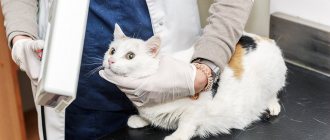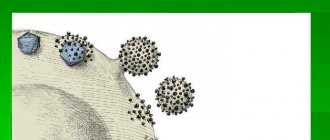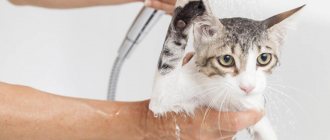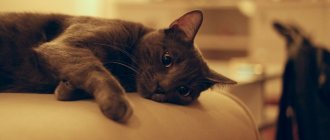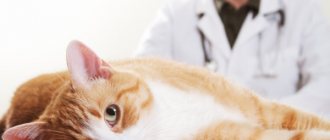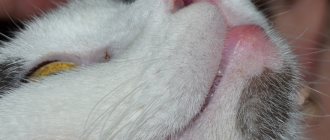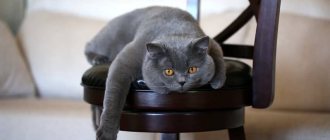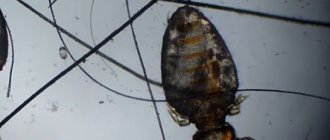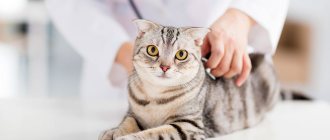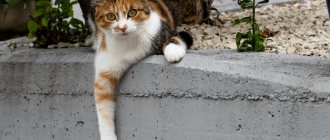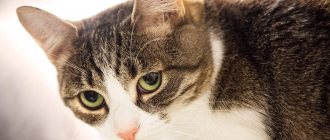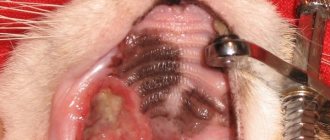What could be the causes of vomiting?
The following reasons are possible if a cat vomits undigested food.
Haste when eating
The cat vomits: vomiting, nausea, causes and treatment
Due to habit, cats may eat hastily but drink little. Lack of fluid in the body leads to vomiting. In this case, add a little water to the food. But you shouldn’t wait for the granules to swell, as the cat may not even like such a treat.
Note! Food diluted with water will swell greatly in the stomach. Therefore, standard portions need to be slightly reduced.
Binge eating
Can a cat vomit after eating dry food? Cats do not have a stopcock that will stop them when their stomach is full. They will eat as much as is in the bowl. When overeating, the pet’s stomach does not have time to stretch to accommodate the incoming volumes of food and gets rid of the excess in a simple way.
This phenomenon is especially often observed among owners of several pets, between whom there is a fight for food. Everyone tries to snatch a bigger piece for themselves and no longer cares about the amount of food.
Important! After vomiting, the cat may ask for food again. In this case, it is necessary to limit food intake. It is important that your pet chews the food and not swallows it.
Poor quality diet
If a cat is kept on economy class or cheap food, vomiting is a completely predictable phenomenon. To assimilate the food received, the animal’s body must have enough complete protein. If a cat vomits food, the reason may lie in the lack of this particular element. Cheap food contains very little meat; it is replaced with offal. Also, the preservatives and additives included in the food negatively affect the stomach, causing vomiting.
Important! You should not keep your pet on dry food all year round; it also needs natural food. Food waste from the table is not considered a natural product, since some of it can cause even greater harm to the pet.
Component intolerance
Why does a cat vomit after dry food? She may have allergies or intolerance to the components of the food, especially if it is cheap. Wheat or corn is added to many of these foods.
Vomiting can also be caused by a change in diet, so the body gets used to new foods.
Causes of overeating in cats
There can be several reasons for eating disorders in cats: some of them are explained by the physiological characteristics of the animal, some may have a pathological basis, but most often the owner is to blame for overeating the pet, who does not fully understand the characteristics and needs of the pet.
Selecting foods that contain excess carbohydrates
Foods containing many sources of carbohydrates (grains, legumes, potatoes) are poorly satiating for cats, forcing them to eat more pellets than they should. The reason is the high glycemic index of such products; they quickly break down into simple sugars, which enter the blood and provoke a sharp release of insulin. After this, the blood glucose level also drops sharply, and the animal begins to feel hungry. This, in turn, provokes unwanted behavior, expressed in a constant demand for food.
And this is not the only drawback of high-carbohydrate foods, because cats, as carnivorous animals, do not need this component in their diet at all.
Their natural diet consists exclusively of meat, therefore, on feeds that contain little of it, they experience a deficiency of animal protein, and this cannot be compensated for by plant protein contained in grains, legumes and potatoes. Sooner or later this will lead to metabolic disorders and various diseases, including obesity. Therefore, choose food based on meat ingredients with a sufficient amount of animal fats - they saturate the animal with energy for a long time.
Failure to comply with the daily norm
The packaging of each ready-made industrial diet shows the daily requirement for a reason - it contains the amount of macro- and micronutrients, as well as calories, required by an animal of a certain weight. Even a slight excess of 10–20 grams of dry food will ultimately result in overeating and then excess weight, because the granules of these products are devoid of moisture, which means they are very concentrated. It is not difficult to overdo it with the dosage of wet food, which cats usually eat with great appetite, and with natural nutrition you will have to do the calculation of calories and nutrients yourself.
Be sure to follow the recommendations in the feeding chart for both dry and wet food, and carefully measure the daily amount of dry food using a kitchen scale or measuring cup.
Mixed meals and frequent treats
The likelihood of making a mistake in dosing food increases when the owner combines dry food with wet food or adds natural products to the finished food. “In the morning, a handful of dry, and half a bag of wet, and in the evening, chicken fillet” - this is roughly what an improvised mixed diet looks like, and the owner hardly knows how many calories it contains.
Very often, treats are added to this, which are not perceived by the owners as food, however, even a tiny, from a human point of view, piece of cheese, sausage or some deli meat in terms of calorie content can easily replace a full portion of dry and wet food, especially when the pet is pampered all family members take turns.
In this case, overeating in cats is absolutely inevitable, and therefore it is necessary to adhere to the rule: treats and treats should make up no more than 10% of the total diet. When making calculations, do not forget that dry food contains only 10% moisture, and this must be taken into account when calculating the daily intake of treats.
Let's say your cat's daily intake is 60 g, respectively, 10% of it will be 6 g. On average, the moisture content of dry food is 10%, and of any natural product, for example, meat, 80%. We make up the formula: 6x80/10 = 48 g, this is exactly the piece you can treat your cat to every day without the risk of causing overeating.
Stress and illness
As in humans, binge eating disorders can arise from psychological or health reasons. Under severe short-term stress, animals usually lose their appetite, but under chronic stress, that is, in a state of tolerable but constant anxiety, cats may well begin to overeat. This happens especially often when stress is associated with the arrival of a new pet in the house, which is aggravated by competition for food. In this case, we advise you to feed the cats in different rooms and pay more attention to the old-timer.
Increased appetite can also be caused by various diseases: diabetes and other endocrine disorders, helminthic infestations, diseases of the digestive tract, etc. If this behavior was previously unusual for your cat, then you should definitely check its health by contacting a veterinary clinic.
Individual or breed characteristic
Some cats have an increased appetite, as they say, by nature or, more precisely, by breed. Hairless cats, for example, the Canadian and Don Sphynx, have an accelerated metabolism, and therefore are always willing to eat. Such livelies as the Abyssinian, Oriental, and Egyptian Mau often overeat. Representatives of these breeds do not hesitate to steal food from the table, destroy kitchen cabinets and pantries, and do this not so much for the sake of food as out of sporting interest, the instinct of a provider - but an excess of calories, even for such active hunters, can ultimately result in excess weight. British and Persian cats and Cornish Rex cats are also at risk for obesity - you need to pay special attention to the diet of such cats and weigh your pet regularly.
Finally, animals that have survived a long period of starvation and are picked up from the street are also prone to overeating. Moreover, in most cases, the cats themselves, having made sure that there is always food where they ended up, calm down, but their owners, in their good desire to fatten the poor fellows, often cannot stop... As a result, after six months, the “living skeleton” turns into a ball legs. Don’t repeat this mistake: feed your cat according to the norm intended for a cat weighing 4–4.5 kg (about the size of outbred animals on average), and be patient - gradually your pet will acquire a healthy look and shape.
What symptoms require you to go to the clinic?
If the cat vomits food once, it is too early to panic. You should pay attention to the pet’s condition: whether its eyes are shiny, whether its nose is cold, what mood it is in - lethargic or active. Perhaps everything is fine with your health, but vomiting is caused by overeating.
A cat vomits fur every day: what to do?
If a cat vomits food regularly, it is accompanied by poor health and impurities of blood or bile in the rejected masses, the animal should be taken to a doctor for examination. Especially if the vomit is yellow or green.
If this cannot be done in the near future, you should provide first aid yourself. It consists of limited consumption of water and food: the latter is fed in small pieces every 2 hours. Only easily digestible foods are suitable: boiled chicken, cottage cheese or baby food.
Important! Don't put off going to the clinic. Regular vomiting can be a signal of dangerous diseases.
Urgent medical attention is required if:
- vomiting continues for more than a day;
- the pet refuses food and water;
- the rejected masses contain admixtures of mucus or blood;
- The cat’s well-being and mobility deteriorate.
Binge eating
If a cat vomits undigested food, what should I feed it?
Trying to switch a cat that has vomited food to natural food or canned food may not work or even make the situation worse. A sudden change in the type of diet received often provokes intestinal upset and, accordingly, has a negative impact on an already unwell animal.
We recommend reading: Conjunctivitis on the Eyes of Toy Terrier Dogs Signs
We recommend monitoring how much your cat drinks and feeding it super premium dry food. Moreover, this food must be selected in original packaging; this is the only way you can guarantee that it was stored in proper conditions.
Sanabelle food from Bosch is one of the best options available on the market today. Our food contains substances necessary to maintain the health of your pet, helps prevent urolithiasis and facilitates the removal of hairballs naturally.
Trying to switch a cat that has vomited food to natural food or canned food may not work or even make the situation worse. A sudden change in the type of diet received often provokes intestinal upset and, accordingly, has a negative impact on an already unwell animal.
What to do if your cat vomits after eating undigested food
A cat vomits food once - this is an incident that is unlikely to pose a threat. Repeated situations require medical intervention.
Feed your cat more often, but with less food
The volume of a cat's stomach is small. Rather than overloading it with huge portions 1-2 times a day, it is better to feed it 4-5 times a day in small portions. This way the pet will be full and not overeat.
What to feed the cat in this case
What to feed a cat after vomiting? Switching to other dry foods will not always bring results, and may even worsen them. A sick pet is gradually fed with natural products: boiled chicken, cottage cheese, baby food.
But you should not immediately switch the animal to natural products after low-quality semi-finished products, since a sudden change in diet will negatively affect the pet’s already poor health.
Doctor
Vomiting of undigested food - causes
First of all, a loving owner should try to understand why the cat has a gag reflex after eating.
There are several most likely reasons:
- Poisoning . The animal's body is trying to cleanse itself of bad food. Vomiting is usually accompanied by diarrhea.
- Infectious diseases of the gastrointestinal tract . These may include pancreatitis, gastritis, and inflammatory processes in the intestines.
- Feeding your cat low-quality food . Economy class dry food contains insufficient amounts of protein and is poorly digestible.
- Big break in diet . If the animal ate a small portion of food at night, white foamy vomit may occur in the morning. This is harmless and goes away immediately after feeding.
- Insufficient amount of fluid . If your cat doesn't drink enough, she may vomit after feeding.
It also happens that the cat regurgitates the fur that got into the stomach during the licking process. This problem can be solved by using a special paste that removes hair, or by regularly brushing your pet.
Preventive measures
Compliance with preventive measures will avoid the problem of indigestion of food. What to do?
- The pet should always have access to clean water, especially if the diet is dry;
- You shouldn’t skimp on your pet’s health; its stomach needs high-quality nutrition. It is better to give him premium food;
- It is better to divide feeding into 4-5 times in small portions, so the cat will not overeat;
- worm your pet regularly, as worms and parasites also interfere with digestion;
- it is also necessary to choose the right food in accordance with the breed, age and condition of the pet;
- Be sure to regularly visit the veterinarian and carry out preventive vaccinations.
Important! You cannot give your pet medications or treatment on your own without a doctor’s recommendation. The owner may incorrectly determine the diagnosis, and attempts to save the pet will only hasten its death.
Natural product
If your cat vomits from food, you should get treatment as soon as possible. Rather than putting off going to the doctor or hoping that it “will go away on its own,” it is better to take measures as soon as possible so that the pet will delight its owner with its love and health for a long time.
What diets are considered unhealthy?
It is impossible to constantly feed the animal only dry food. Cat digestion also requires liquid and soft food. But we must not forget that a pet cannot eat everything that a person eats. For him, some foods from the human diet will be poisonous. Such products include tomatoes and eggplants, however, carrots should be present in the diet of your furry friend.
You should not feed your cat food that contains less than 25–30% meat. It is important that the food contains meat. Unscrupulous manufacturers often add by-products, eggs with shells, poultry bones and everything that is not usually eaten into food. Sometimes a food that is declared as a premium food contains all of the above. When choosing, you need to be very careful and careful. You should not immediately collect several packs of one type of food. If the food is sold by weight, it is better to take 100–200 grams, give it to the animal to try and monitor its reaction. The four-legged friend feels good, he does not vomit this food, which means it is suitable.
We recommend reading: What You Should Do If Your Dog's Eyes Are Festering
What to do?
If you do not have the opportunity to get an appointment with a veterinarian on the same day when your pet becomes ill, then you are obliged to provide him with first aid.
To begin with, the pet must be provided with complete rest and its movement limited. Move food bowls away and leave only clean water available.
Measure your pet's body temperature. If it is elevated, then place a bottle of cold water next to the cat or place a cool compress under the stomach. Wait until morning and go to the clinic.
If the animal remains active after vomiting and retains its appetite, then there is no need to take any radical measures.
We recommend reading: Passing Worms From Animals to Humans
It is enough to put your pet on a diet for a short time to relieve the stomach and normalize the functioning of the gastrointestinal tract. In the first days of the diet, the cat can be offered boiled chicken, baby meat and vegetable purees, and low-fat cottage cheese.
Only when you are finally convinced that your pet has recovered can you return to your previous diet.
If there is a suspicion of an inflammatory process or infection, then self-medication in this case can be disastrous. A diet for a specific disease will not be effective, since the cat itself will refuse water and food.
Overeating and rapid absorption of food
Quite often, a cat may vomit after eating due to overeating or eating food too quickly. In a kitten, the esophagus is horizontal, and when large portions are ingested, the body can close the sphincter located in the lower esophagus and cause regurgitation of undigested food. This vomiting occurs a few minutes after the pet has eaten.
We recommend reading: Cause of Brain Bleeding in Dogs
This behavior is often observed in cats living in the same territory with other animals. The pet is trying to survive the competition and because of this, it tries to eat as much food as possible at one time. If a cat owner is faced with such a situation, then he should change the feeding rules.
It is recommended to give the cat a standardized portion at a time, in which the components are not cut very finely, but not very coarsely. If several cats live in the same house, they should be fed in separate rooms so as not to provoke competition between pets. If your cat feels safe while eating and does not feel threatened by other pets, she will be able to eat slowly and naturally, rather than greedily gulping down the entire portion in a few minutes.
